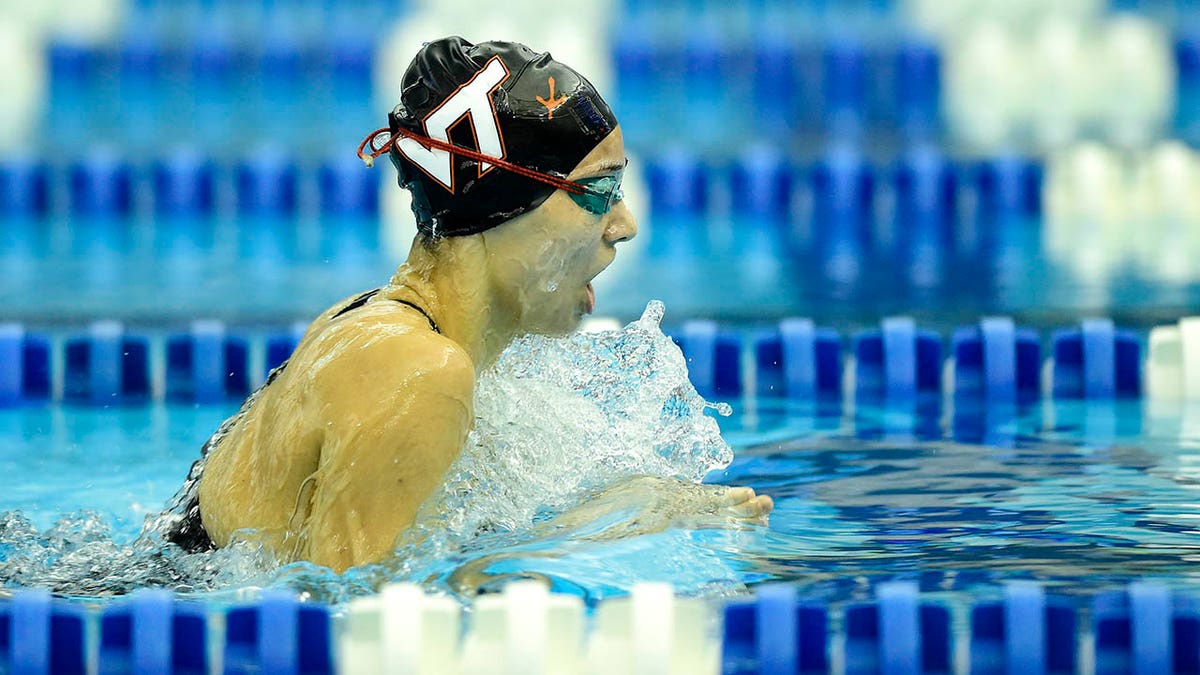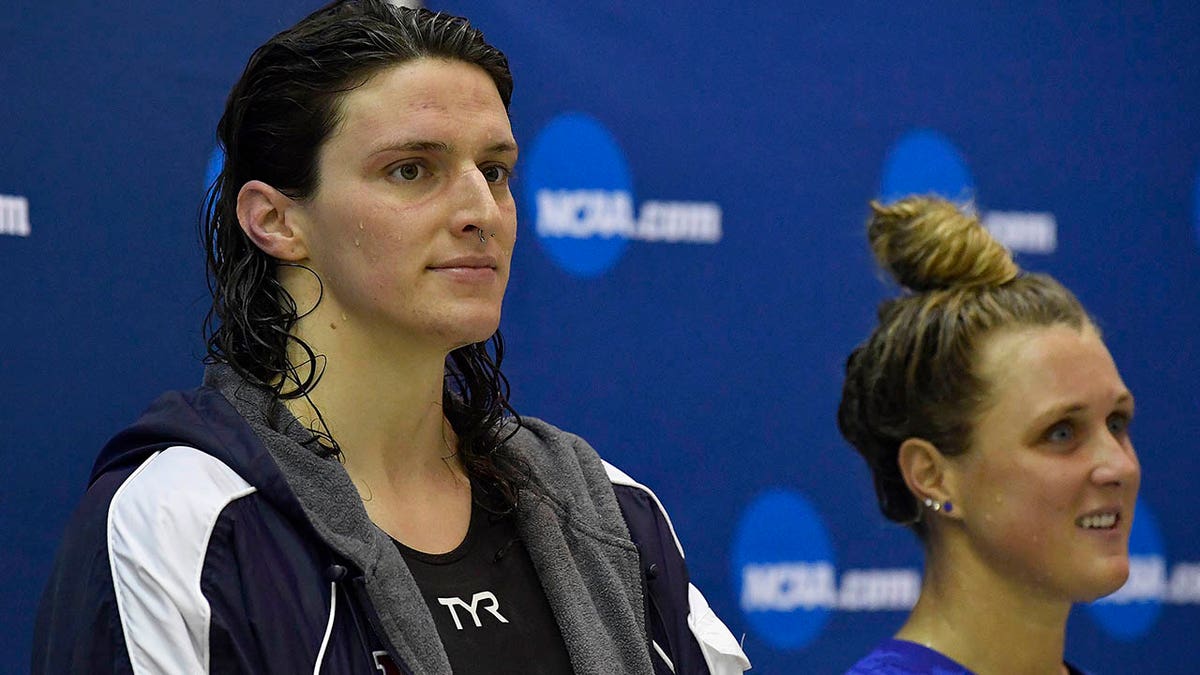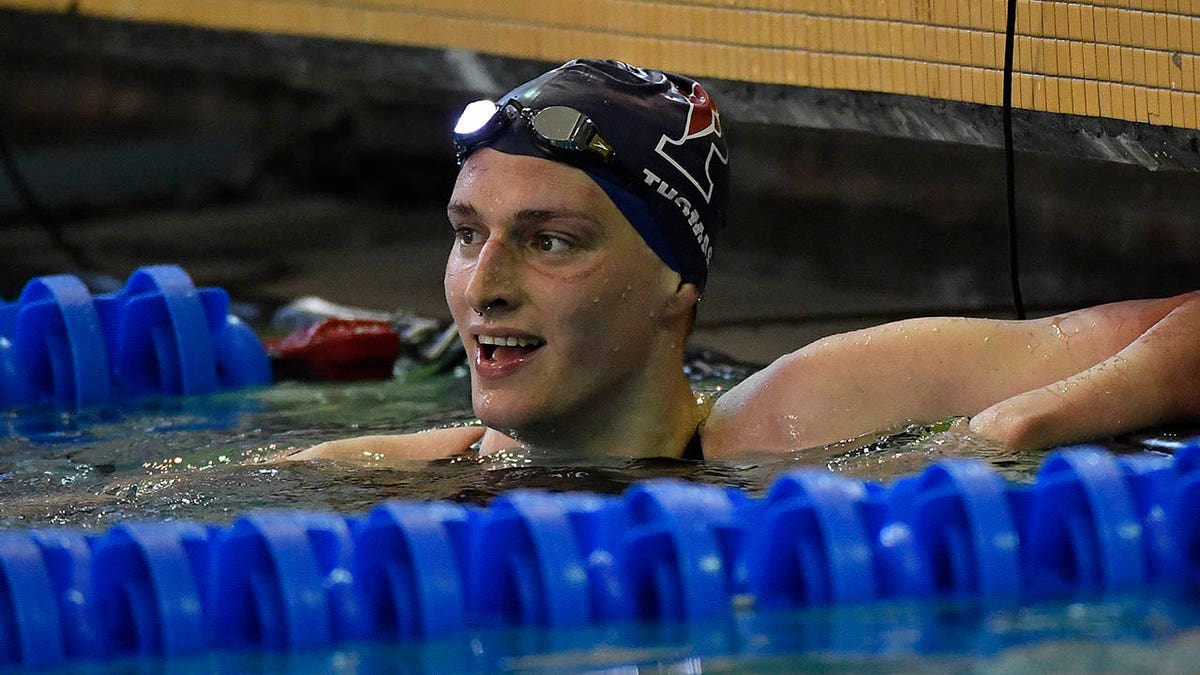Tucker: Transgender swimmer wins NCAA title
Columnist Chadwick Moore reacts to transgender swimmer Lia Thomas NCAA championship win.
Reka Gyorgy, the Virginia Tech swimmer who missed out on competing in the finals of the 500 free at the NCAA Championships earlier in the week, took issue with NCAA rules allowing transgender women to compete against biological females.
Gyorgy had missed the cut-off to get into the consolation final in the 500 free. She finished in 17th place and in the letter argued she missed out because of Lia Thomas’ dominance in the race.
The transgender University of Penn swimmer finished with a 4:33.82 in the preliminaries and later became a national champion when she won the race with a time of 4:33.24.
CLICK HERE FOR MORE SPORTS COVERAGE ON FOXNEWS.COM

Reka Gyorgy competes in the Women's 400m IM during the Toyota U.S. Open Championships at the Greensboro Aquatic Center on November 13, 2020 in Greensboro, North Carolina. (Jared C. Tilton/Getty Images)
She wrote a letter addressed to the NCAA and posted it on her private Instagram account Sunday.
"With all due respect, I would like to address something that is a problem in our sport right now and hurting athletes, especially female swimmers," the letter read. "Everyone has heard and known about transgender swimmer, Lia Thomas, and her case including all the issues and concerns that her situation brought into our sport. I’d like to point out that I respect and fully stand with Lia Thomas; I am convinced that she is no different than me or any other D1 swimmer who has woken up at 5am her entire life for morning practice. She has sacrificed family vacations and holidays for a competition. She has pushed herself to the limit to be the best athlete she could be. She is doing what she is passionate about and deserves that right. On the other hand, I would like to critique the NCAA rules that allow her to compete against us, who are biologically women.
"I’m writing this letter right now in hopes that the NCAA will open their eyes and change these rules in the future. It doesn’t promote our sport in a good way and I think it is disrespectful against the biologically female swimmers who are competing in the NCAA."
Gyorgy, a Hungarian who competed in the 200-meter backstroke at the 2016 Summer Games, explained it felt the last spot to get into the consolation final was taken from her.
LIA THOMAS FINISHES LAST PLACE IN THE 100-YARD FREESTYLE FINAL AT NCAA CHAMPIONSHIPS

Lia Thomas looks on from the podium after finishing fifth in the 200 Yard Freestyle during the 2022 NCAA Division I Women's Swimming & Diving Championship at the McAuley Aquatic Center on the campus of the Georgia Institute of Technology on March 18, 2022 in Atlanta, Georgia. (Mike Comer/NCAA Photos via Getty Images)
"It feels like the final spot was taken from me because of the NCAA’s decision to let someone who is not a biological female compete," she wrote. "I know you could say I had the opportunity to swim faster and make the top 16, but this situation makes it a bit different and I can’t help but be angry or sad. It hurts me, my team and other women in the pool. One spot was taken away from the girl who got 9th in the 500 free and din’t make it back to the A final preventing her from being an All-American. Every event that transgender athletes competed in was one spot taken away from biological females throughout the meet."
Gyorgy added the NCAA "knew what was coming this past week" and wrote the media circus around the NCAA Championships this week put in the shadows the incredible performances from other competitors.
"It is the result of the NCAA and their lack of interest in protecting their athletes. I ask the NCAA takes time to think about all the other biological women in swimming, try to think how the would feel if they would be in our shoes. Make the right changes for our sport and for a better future in swimming," the letter concluded.
The NCAA didn't immediately respond to Fox News Digital's request for comment.
Thomas’ dominance in the pool had been a point of contention all season long. She received the all-clear to compete in the Ivy League and NCAA Championships in the days leading up to the events.
The NCAA updated its transgender participation policy back in January to defer to the guidance of each sport’s governing body. The NCAA announced that its policy would become effective in March, starting with the Division I Women’s Swimming and Diving Championships.

Lia Thomas looks on after winning the Women's 500 Yard Freestyle during the 2022 NCAA Division I Women's Swimming & Diving Championship at the McAuley Aquatic Center on the campus of the Georgia Institute of Technology on March 17, 2022 in Atlanta, Georgia. (Mike Comer/NCAA Photos via Getty Images)
CLICK HERE TO GET THE FOX NEWS APP
USA Swimming updated its policy shortly after requiring transgender athletes who are competing at an elite level to have small levels of testosterone — half of what Thomas was allowed to compete with — for at least 36 months before being eligible, but the NCAA said weeks later that the Administrative Subcommittee of the Committee on Competitive Safeguards and Medical Aspects of Sports (CMAS) decided that it wouldn’t alter its testosterone guidance, stating that "implementing additional changes at this time could have unfair and potentially detrimental impacts on schools and student-athletes intending to compete in 2022 NCAA women's swimming championships."

